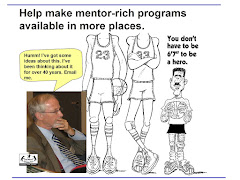 |
| tutoring program alum |
I'm proud that the tutor/mentor programs I led from 1975 to 2011 now boast many college graduates and a few with advanced degrees. Even more, I'm really happy to see posts by alumni on Facebook, showing their own kids now entering college.
That shows a long-term benefit that we struggled to find support for each year between 1990 and when I left the program in 2011 (due to lack of funds.)
Last week I had a conversation with an education advocate and remarked that while so much attention, and funding, focuses on education and college attainment and graduation, too little focuses on "social capital" or the network of people who help you with job interviews and promotion and life challenges.
I've been pointing to articles about social capital for many years. Here's a quote from a 2002 article.
“Social networks that can bridge across geography, race and class are key to success in the new economy”, says Professor Manuel Pastor, Jr., University of California, Santa Cruz, who has studied social networks in Los Angeles among Latinos. ‘Hard’ skills are essential, but it’s the connections and mentoring that provide information about what skills are necessary and a vision of how acquiring them can lead to new opportunities for all our residents”.This section of the Tutor/Mentor web library contains many more articles that I hope funders, policy makers and program leaders will study.
When I use graphics like this I'm visualizing a design of an ideal tutor/mentor program, or public school, showing that students are connected to a wide range of adults through on-going mentoring, tutoring and other learning activities.
If such connections start early, many can continue for a lifetime and many will open doors to colleges and universities that might now be closed, and to jobs and careers that might now seem out of reach.
Program leaders, board members, donors and business partners all need to embrace this vision and compete with the education lobby for on-going, long-term, flexible funding of programs that build social capital as part of helping kids grow up.










No comments:
Post a Comment